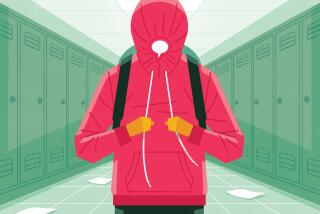Exploring the Differences That Define Us
- Share via
An old friend from high school called the other day, so we put our minds in reverse and floated back.
We chewed over old Mr. Huff in sophomore geometry and that yahoo yearbook picture of us panning gold. My friend reported how so-and-so looked at the last reunion--was it 15?--and I wondered what ever happened to you-know-who.
My friend’s a businessman now, respectable and proud, a father of two. His wife is a professional. They own a nice home. I would have been surprised if it were not so.
It was great to talk to this man; I think it’s been only once before in 20 years. And I was still imagining this tall kid with freckles and wild curly hair.
Tom is what I called him, even though that was never his name. It is a stupid joke that we’ve kept between us all these years. He told me that I sounded the same, especially when I suggested that he gather some information for me and report back. (He said he’d do it, nonetheless.)
Then out of nowhere, Tom toppled the history that I thought we had shared. I thought he was just another middle-class kid who went to the games and the dances, the president of the senior class, a boy who could pal around with a girl.
I thought he had a mother and a dad living in the same house with maybe brothers and sisters, probably a dog. I thought we were peering through this nostalgia with the same fuzzy lens.
But Tom was a foster child, separated from his brothers early on. “That’s why I never had you over,” Tom is telling me now.
Yet I don’t remember ever wondering about that.
I don’t think I knew what a foster child was back then. Would it have mattered to me if I had? I doubt it. But it mattered deeply to Tom, even now. He felt different from me and my other friends.
Tom says his foster family essentially saved his life. His mother was an alcoholic and a battered wife, and now she’s dead, recently killed in a boarding house. Tom’s just testified at the trial of the woman charged with her death.
I bring this up because Tom’s story has been echoing through me a lot. The differences among people are always in the news. We may talk of “celebrating” them, but not many of us really do. We blame differences when things go wrong.
We’ve developed litmus tests to help us with this task. Tell someone what you think about abortion, gun control, the death penalty, prayer in school, taxes, the spotted owl, day care, immigration, and they’ve put you in a category that will order all the rest of your thoughts too.
Those who place a premium on getting along tend to keep their mouth closed.
Check a box for religion, ethnicity, gender, sexual orientation, annual income, marital status and the make and model of your car (you do own one, don’t you?), and you might as well wear a sign, “I am your (friend/enemy/clone).”
And people like to do this. It helps them avoid mistakes. “Gee, here I thought you were my friend and I find out you listen to Howard Stern.”
I am exaggerating, of course. But not by much.
So maybe being a foster child is no big deal today. I say this having never been one, having never imagined the stigma and hurt one might feel. Yet now I’m thinking about Tom. Maybe he kept his secret as an insurance policy for friends.
I’m ashamed to think he thought he needed it, even back then.
But Tom and I didn’t grow up in some fairy tale where nobody cried or got hurt. Calamities happened, but it seemed we could count them on our hands.
One friend’s boyfriend was killed while riding his motorcycle away from her home. Then she gave birth to a child he had fathered and left him with her mother to raise.
Another girl had an abortion, and then boasted about it to the wrong ears. She was kicked off the song-leading squad, but won reelection the next year. Another friend kept changing her last name. Her mother would divorce, then marry again.
I hear all the time about how much rougher it is growing up these days and, in many respects, I know that to be true. All the wise parental analogies of my generation aren’t going to work with our kids, and I’m not talking about the one where Dad walked miles through the snow to reach school.
But there are constants too. Human differences are always going to be there. We should acknowledge them, try to change them if they are bringing us down, but never give them the power to define our lives.


